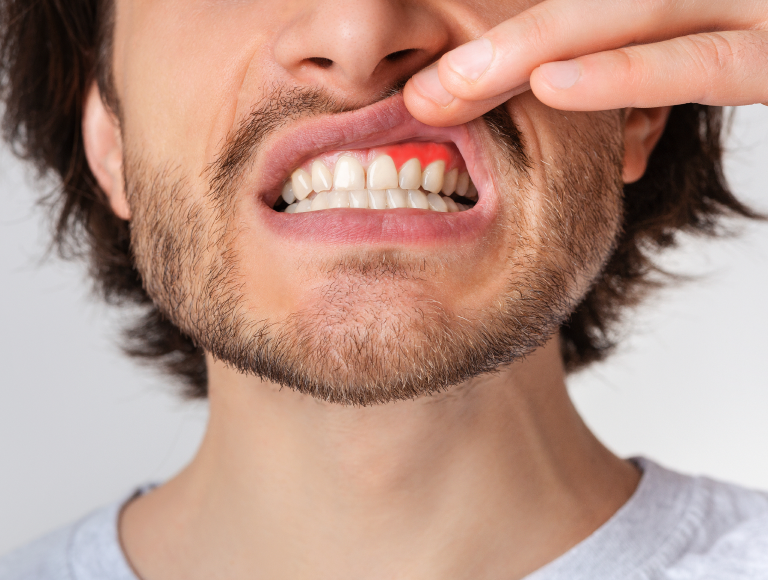Our Jupiter Dentist Can Help Reverse the First Stage of Gum Disease


Gingivitis is a common but preventable gum disease that can lead to serious dental issues if left untreated. At Jupiter Dentistry, we specialize in periodontal therapy to help you combat and reverse the effects of gingivitis, restoring your oral health and ensuring a bright, healthy smile. If you’re in Jupiter, FL, and struggling with gum inflammation or bleeding gums, our dental team is here to provide personalized treatment plans to meet your unique needs.
At our Jupiter dental office, our dentist aims to keep our patients well-informed about their conditions and offer personalized treatment. To schedule your appointment at Jupiter Dentistry, contact us today at (561) 575-5599.
What Is Gingivitis?
Gingivitis is the earliest stage of periodontal disease, characterized by inflammation of the gums caused primarily by plaque buildup on teeth. If untreated, gingivitis can advance to more severe forms of gum disease, such as periodontitis, which may lead to tooth loss.
Symptoms of Gingivitis
The symptoms of gingivitis can vary from person to person. Common signs and symptoms of gingivitis include:

- Redness: The gums appear red or reddish-purple instead of their normal pink shade.
- Swollen Gums: The gums become swollen or puffy, making them appear larger than usual.
- Bleeding Gums: Gums may bleed during brushing, flossing, or even while eating. Blood can be seen on the toothbrush or in the saliva.
- Tender or Sensitive Gums: The gums may feel tender or sensitive to touch. They may also be painful or uncomfortable when pressure is applied.
- Bad Breath: Persistent bad breath, also known as halitosis, is a common sign of gingivitis. It occurs due to the presence of bacteria in the mouth.
- Receding Gums: The gum line may start to recede or pull away from the teeth, exposing the roots of the teeth.
- Loose Teeth: In some cases, gingivitis can lead to loosening of the teeth or changes in their alignment.
If you notice any of these symptoms, contact Jupiter Dentistry as soon as possible. Early intervention can prevent the progression of gum disease and save you from more complex treatments down the line.
Causes of Gingivitis
The primary cause of gingivitis is plaque, a sticky, bacteria-laden film that forms on your teeth. Plaque develops when sugars and starches in your food interact with bacteria in your mouth. Without regular brushing and flossing, plaque can harden into tartar (calculus), which irritates the gums and leads to inflammation.
Additional factors contributing to gingivitis include:
- Poor oral hygiene: Inconsistent brushing and flossing habits allow plaque to build up.
- Smoking or tobacco use: Smoking impairs gum tissue and weakens your immune response, making it easier for gum disease to develop.
- Hormonal changes: Pregnancy, menstruation, and menopause can make gums more sensitive, increasing the risk of gingivitis.
- Certain medications: Drugs that reduce saliva flow or affect gum tissue can promote gum disease.
- Medical conditions: Diabetes, cancer, and other systemic conditions can compromise your immune system, leading to increased vulnerability to gum disease.
To treat gum disease, contact our dentist in Jupiter today for an appointment.
How to Treat Gingivitis
Several steps can be taken to treat gingivitis.

- Improve Oral Hygiene: Brush your teeth at least twice a day using a soft-bristled toothbrush and fluoride toothpaste. Make sure to brush along the gumline and all tooth surfaces. Floss daily to remove dental plaque and food particles from between your teeth.
- Use Antiseptic Mouthwash: Rinse your mouth with an antiseptic mouthwash after brushing and flossing. This helps reduce bacteria and plaque.
- Professional Dental Cleaning: Visit our dentist for professional dental cleanings. A dental hygienist will thoroughly clean your teeth, removing plaque and tartar buildup that can’t be eliminated through regular brushing and flossing. They may also recommend a deeper cleaning, such as scaling and root planing to reverse your gingivitis symptoms.
- Maintain a HealthyDiet: Limit your consumption of sugary and acidic foods and drinks, as they can contribute to gum inflammation. Instead, opt for a balanced diet rich in fruits, vegetables, whole grains, and lean proteins.
- Quit Smoking: Smoking weakens the immune system and makes it harder for your gums to heal. Quitting smoking can significantly improve the health of your gums.
- Manage Stress: Chronic stress can affect your oral health. Find healthy ways to manage stress, such as regular exercise, relaxation techniques, or seeking support from loved ones.
- Regular Dental Checkups: Visit our dentist for regular checkups. They’ll monitor the condition of your gums and provide necessary guidance and treatment.
Gingivitis Treatment Costs


The costs of gingivitis treatment can vary depending on several factors, including the severity of the condition, the recommended treatment plan, and the geographical location. General cost estimates for common gingivitis treatments are:
- Professional Dental Cleanings: The cost of a routine dental cleaning can range from $75 to $200. However, if there’s a significant buildup of plaque and tartar requiring a deep cleaning, also known as scaling and root planing, the cost can be higher, typically ranging from $200 to $400 per quadrant of the mouth.
- Antibiotic Therapy: In some cases, antibiotics may be prescribed to treat gingivitis. The cost of antibiotics can vary depending on the specific medication prescribed and whether it’s covered by insurance.
- Additional Treatments: If gingivitis has progressed to a more severe stage or if there are other underlying dental issues, additional treatments may be required. These can include periodontal surgeries, gum grafting, or other specialized procedures. The costs for such treatments can vary significantly.
Frequently Asked Questions
Is gingivitis contagious?
No, gingivitis is not contagious. It’s a bacterial infection caused by the buildup of plaque on your teeth and gums, which is only created due to a lack of daily brushing and flossing.
How long does it take for gingivitis to go away?
The time it takes to reverse gingivitis depends on the severity of the condition and how well you follow your dentist’s recommendations. With consistent oral hygiene and professional treatment to remove plaque and tartar buildup, you may start to see improvements in as little as two weeks.
Is gingivitis reversible?
Yes, gingivitis is reversible with proper treatment and improved oral hygiene habits. However, if left untreated, gingivitis can progress to a more serious form of gum disease called periodontitis, which can cause permanent damage to your teeth and gums.
How can I prevent gingivitis?
You can prevent gingivitis by practicing good oral hygiene habits at home, including brushing your teeth twice a day, flossing at least once a day, and using an antiseptic mouthwash. Make sure to also schedule regular dental checkups and cleanings to prevent the buildup of plaque and tartar on your teeth and gums.
What is the difference between gingivitis and periodontitis?
Gingivitis is the early stage of gum disease and affects the tissues that surround and support your teeth. It’s caused by the buildup of plaque on your teeth and gums. If left untreated, gingivitis can progress to a more serious form of gum disease called periodontitis, which affects the bone that supports your teeth.
Reverse Gingivitis with Our Jupiter Dentist
for the condition to worsen. Schedule an appointment with Jupiter Dentistry today to receive exceptional care and personalized treatment.
Contact our dentist in Jupiter today at (561) 575-5599 to schedule your dental appointment and take the first step toward a healthier smile. Stop periodontal diseases in their tracks with regular dental care.


Complimentary Consultation
or 2nd Opinion
- Exam
- Full mouth X-rays
- Private Consultation with Doctor ($350 value)
- 2151 FL A1AAlt #1300,
Jupiter, FL 33477 - (561) 575-5599
- Monday: 8am - 5pm
- Tuesday: 8am - 5pm
- Wednesday: 8am - 5pm
- Thursday: 8am - 5pm
- Friday - Saturday - Sunday: Closed